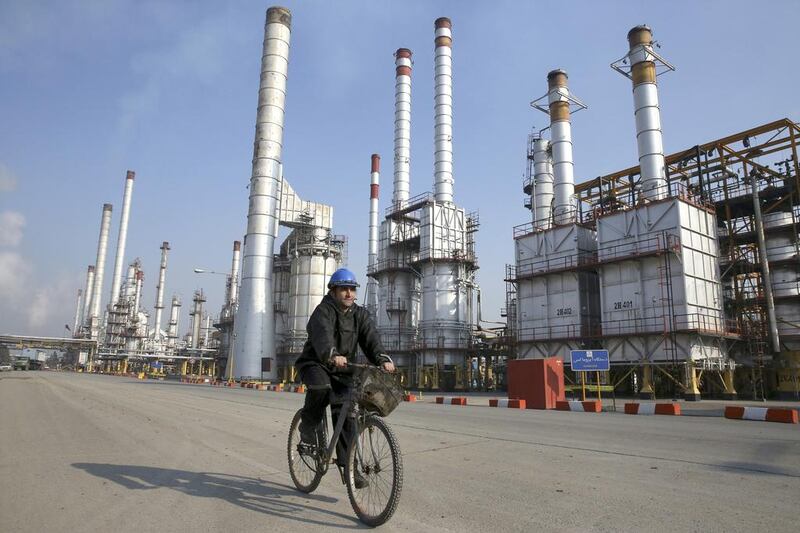Ample supply and the nuclear deal with Iran have pushed the price of West Texas Intermediate down about US$9 per barrel to just more than $50 since the beginning of this month.
But the $30 per barrel levels predicted by some New York analysts are very unlikely to be seen.
The oil sanctions on Iran will not be lifted until the end of the year, only after the International Atomic Energy Agency issues a report in mid-December on Iranian compliance with the agreement reached last week in Vienna. That means it will be 2016 before any of the 0.5 million barrels per day (mbpd) of spare capacity promised by Iranian oil minister Bijan Zanganeh can be added to Opec supply.
In the meantime, it is simply not in the interests of Saudi Arabia and other Arabian Gulf producers to flood an already amply supplied market with incremental barrels because national budgets are critically dependent on the price of oil. Increasing market share remains a key objective, but doing so recklessly is not on the agenda, despite all the rhetoric.
This was clearer than ever in the refusal of both Saudi Arabia and the United Arab Emirates to agree this year to exceptional Chinese requests for extra barrels to increase the rate at which Beijing is filling its strategic storage with inexpensive oil.
Riyadh and other Gulf policymakers are making the best of a bad thing because prices above $60 seem to be the critical level for new US shale oil production, and a lot of other high-cost non-Opec projects around the world. But revenue requirements mean that Opec producers are not about to give away their oil, and $50 per barrel is probably the level below which a certain amount of price management begins to creep in.
Increasing market share is not going to happen overnight, given the long leads and lags in oil production capacity additions. Even though North American oil financial statements are bleeding, the US will still add nearly 1 mbpd to its oil output levels in 2015, according to American Energy Information Agency projections. A full pipeline of megaprojects mean that Canada too is expected to add 0.8 mbpd to its output by the end of the year.
It will require time for lower oil prices to take their toll on higher-cost non-Opec supply. Nowhere is this clearer than in the heavily researched Opec Monthly Oil Market Report (MOMR), which last week revised its field-by-field forecast to show non-Opec supply continuing to rise through the end of next year.
The MOMR detailed that Opec has only added 1.1 mbpd to its market share since it abandoned price management last year. Most of this has come from Iraq, which reached output levels of 4mbpd by the middle of the year, up from 3.4mbpd in the fourth quarter of 2014.
Iraq capacity additions ground to a halt this year when Baghdad stopped paying Kurdistan and the international oil companies redeveloping fields in the south. But now the oil ministry has reached an accommodation under which the international oil companies are being paid in crude, including a new Basrah heavy grade, and output has begun expanding once more.
Iraq is scheduled to add another 0.5mbpd or so by the end of the year, so this does not leave a lot of room for other Opec producers to ramp up production. Fortunately, the MOMR and other forecasts are revising up oil demand growth to about 1.3 mbpd per year in both this year and 2016.
Still, the market will be finely balanced because Saudi production has risen about 0.5mbpd over the past year. Riyadh could easily have added much more than this, but the effect on prices would have been disastrous. Clearly a certain amount of price management is occurring because the kingdom is not about to cut off its nose to spite its face.
Jim Crawford is the managing director at the UAE-based Inter Emirates General Trading Company.
business@thenational.ae





